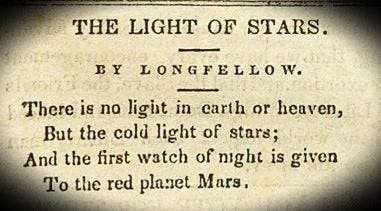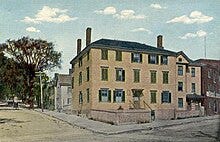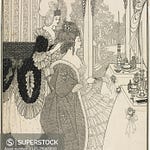One of my favorite anecdotes of American life, such as it was, comes from Cambridge, Massachusetts, on February 27, 1882. You’ll have heard of Cambridge? A well-known college is located there. In those days, though, things were different at that college, because you’d need a lot of Latin and some Greek just to get in, and you’d likely study, in a serious way, much of what we call “classical” subjects, such as literature, history, philosophy, and divinity. And in fact the author of our Poem of the Week, Henry Wadsworth Longfellow, taught there for many years.
But you shouldn’t think of him as a snob — far from it! Longfellow was a man of the people, a quiet and gentle man who didn’t make a fuss about himself — unlike Walt Whitman, he never chloroformed a butterfly in order to paste it on his finger, as if it had just landed there, for a photograph. He loved family life; he loved children. So on that chilly afternoon in February, several boys showed up at Longfellow’s house to wish him a happy 75th birthday. “You’re our favorite poet of all!” they said. And Longfellow — so shy of the stage that when he read a poem at his fiftieth reunion at Bowdoin College, the men in the audience could hardly hear him — invited the boys right in, and they had tea and scones and they talked happily about poetry and about other boyish things till the sun went down and it was time for the lads to go home. That was Longfellow’s last birthday in the world. He died a few weeks later, and the whole nation mourned him. Would they mourn him now? I don’t know. Here’s a picture of his birthplace below, in Portland, Maine. A handsome house — which was torn down in 1955.
What did the boys admire? I can venture a guess, from this week’s poem: simple plain-dealing manly courage. Longfellow wrote “The Light of Stars,” calling it a “psalm of life,” in 1838, a few years after the death of his first wife, Mary, in childbirth. He was still young, and he was and always would be a man of strong feelings, and Mary’s death shook him to the core. But he did not lose his faith in God, and he did not take to drink or to other vices to coat his sorrow over with a little false pleasure.
In “The Light of Stars,” Longfellow does not sentimentalize those twinkling points in the night sky. He feels their light as cold, and he says that the light within his soul is cold, too. But there is one star above that holds out to him the better way of courage. It is the red star of Mars. We know, and Longfellow knew of course, that Mars is a planet, a “wanderer,” which is what the Greek word meant, because while the stars maintain their position relative to one another, the planets move into and out of the constellations of the zodiac as they make their own way, each of them, revolving around the sun. Yet in the poem, it’s Mars that is constant, Mars that like a soldier shows the red heart of constancy and resolution. Mars, not Venus, stands like a sentry in the watch of the night. Mars is bracing, bold, with a gauntlet of steel.
The lesson Longfellow wishes to impart to us is a simple one, but so are many of the truths of our life on earth, and it’s the false and sophisticated who like to find ways to ignore them. It is the same lesson that Saint Paul would give us: that strength is made firm and pure in suffering. We don’t boast about it. We keep the faith. And Longfellow gives us these words in a poem that is in good familiar English ballad meter, simplicity itself — but a lot of delicate art can wear a simple robe.
So then, do not give up hope! He who scattered the stars across the heavens looks upon you, too, and does not forget.
The night is come, but not too soon; And sinking silently, All silently, the little moon Drops down behind the sky. There is no light in earth or heaven But the cold light of stars; And the first watch of night is given To the red planet Mars. Is it the tender star of love? The star of love and dreams? O no! from that blue tent above, A hero's armor gleams. And earnest thoughts within me rise, When I behold afar, Suspended in the evening skies, The shield of that red star. O star of strength! I see thee stand And smile upon my pain; Thou beckonest with thy mailèd hand, And I am strong again. Within my breast there is no light But the cold light of stars; I give the first watch of the night To the red planet Mars. The star of the unconquered will, He rises in my breast, Serene, and resolute, and still, And calm, and self-possessed. And thou, too, whosoe'er thou art, That readest this brief psalm, As one by one thy hopes depart, Be resolute and calm. O fear not in a world like this, And thou shalt know erelong, Know how sublime a thing it is To suffer and be strong.
Word & Song is an online magazine devoted to reclaiming the good, the beautiful, and the true. We publish six essays each week, on words, classic hymn, poems, films, and popular songs, as well a weekly podcast, alternately Poetry Aloud or Anthony Esolen Speaks. To support this project, please join us as a free or paid subscriber.
We welcome the many new subscribers who joined us in the last few weeks, during Advent and Christmas and Epiphany. And we are grateful for all of our paid subscribers who support Word & Song. If you are a new paid subscriber or a gift recipient, please do visit our archive of many hundreds of essays, all of which are available to you on demand as a benefit of your subscription.
The comments and discussions on our posts have become lively since Thanksgiving, so don’t be shy about chiming in! We can’t reply to every comment but we do read them all, and we reply as often as time permits. Thanks again for joining us!















Share this post